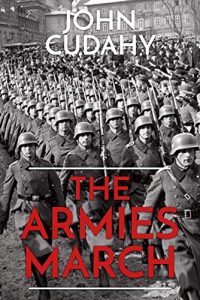John Cudahy’s The Armies March is a personal account of the early days of Nazi Germany’s sweeping invasion and conquering of Europe.
The tale begins in Belgium in the first half of 1940, as rumors of the advance of the German army spread.
Though such rumors are initially derided and popular opinion declares that an invasion will never come, it gradually becomes clear that there is no resisting the power of the Nazis.
With the Belgium government in exile, Cudahy returns to the United States, where the abundance and excesses of the American people creates a striking contrast to the privations he witnessed in Europe.
His feelings of guilt send him back to Europe, where the Nazi flag waves proudly over Germany’s conquered nations, in the capacity of a journalist.
During his time in Berlin, he speaks with a few high-ranking officials, but most refuse to be interviewed. Discouraged, Cudahy makes plans to leave, but on the day of departure word comes that Hitler has granted him an interview.
He travels to Hitler’s remote residence and conducts an interview focusing on questions of Germany’s approach to US convoys, the likelihood of Germany invading the western hemisphere, and thoughts on the path of American-German relations after the war.
Cudahy offers thoughts regarding Germany’s economic situation, which was based on a barter system rather than on a gold standard, and the intended German approach for post-war economics and international trade.
He also writes of Germany’s armies, particularly about the inculcation of young men and women in labor camps regarding the Nazi Party’s platform and beliefs.
Published in 1940, early in the war, Cudahy’s account depicts a Europe at the height of Germany’s power, when the British had retreated and the Americans had declined to officially support the Allies and declare war. As a retrospective look, it offers in the moment thoughts and reflections at a time when an Allied victory seemed but a pipe dream.
Praise for John Cudahy
‘The nub of the book is in the chapter about Cudahy’s meeting with Hitler’ – The Pittsburgh Press
‘He has been charged by some of his compatriots with being too tolerant of totalitarian ideals, or at least lacking in moral indignation at the manner in which the Nazis are putting them into effect. After reading this account of his experiences abroad one can understand how these criticisms came to be made.’ -Foreign Affairs
John Cudahy (1887-1943) served in the First World War as a lieutenant with the US 339th Infantry Regiment, predominantly in Russia. In the Interwar Years Cudahy served as ambassador to several European countries, including Poland, Ireland, and Belgium and Luxembourg. Following the German invasion of Belgium, he left the country and later returned to Europe in a journalistic capacity, including an interview with Adolf Hitler. He died prior to the end of the war, after being thrown by his horse.






